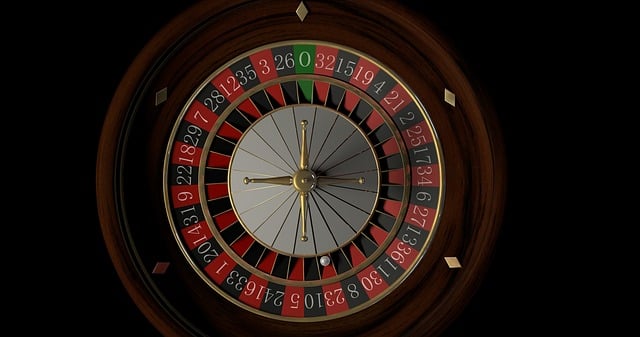Mastering Roulette Strategy: Odds, Systems & Advanced Tactics

Mastering roulette odds is key to any winning strategy. Lower odd bets like single numbers reduce ho…….
Welcome to an in-depth exploration of the captivating world of Roulette Strategy—a dynamic field that intertwines gaming, mathematics, psychology, and global economic trends. This article aims to guide readers through the intricate mechanisms, historical evolution, and far-reaching implications of this fascinating subject. From its humble beginnings as a casino game to its emergence as a strategic cornerstone in diverse industries, Roulette Strategy has left an indelible mark on entertainment, finance, and technology. As we delve deeper, you’ll uncover insights that range from the mathematical precision behind winning bets to the global impact of regulatory policies. Get ready to navigate through a symphony of data, history, and innovative ideas as we unravel the many facets of Roulette Strategy.
Definition: Roulette Strategy encompasses the systematic approach and techniques employed by players, operators, and professionals in the game of roulette to enhance their chances of success. It transcends mere luck and delves into the realms of probability, statistics, behavior analysis, and strategic decision-making.
Core Components:
Mathematical Foundation: Roulette Strategy leverages advanced mathematical concepts such as probability theory, statistical analysis, and number patterns. Understanding these principles allows players to identify favorable betting opportunities and manage their bankroll effectively.
Game Analysis: This involves studying the behavior of the roulette wheel, ball, and other players’ strategies. By observing patterns, one can predict potential outcomes and make informed decisions.
Bankroll Management: A crucial aspect, bankroll management ensures that players bet within their means and maximize their playing time. It involves setting budgets, determining bet sizes, and knowing when to walk away.
Psychological Warfare: The mental game is as important as the physical one in roulette. Strategies include controlling emotions, maintaining focus, and adopting a consistent approach, even after wins or losses.
Historical Context:
Roulette’s origins can be traced back to 17th-century France, where it evolved from various card games. Over time, it gained popularity worldwide, becoming a staple in casinos. The game’s simplicity and allure have led to numerous variations, each with its unique strategic considerations. From European Roulette to American Roulette, the evolution of this game has shaped its strategy landscape significantly.
International Influence: Roulette Strategy has transcended geographical boundaries, becoming a global phenomenon. Its impact is felt across continents, each region adopting and adapting strategies to suit local preferences and regulatory environments.
Key Trends:
Online Casino Revolution: The rise of online gambling has transformed the way people play roulette. It has democratized access, allowing players worldwide to engage in virtual versions of the game from the comfort of their homes. This trend has spurred innovations in software development and live streaming technologies.
Mobile Gambling Boom: With smartphones and tablets becoming ubiquitous, mobile roulette apps have gained immense popularity. These apps offer convenience, accessibility, and often, enhanced graphics and features.
Regulated Markets: As governments recognize the potential economic benefits of gambling, regulated markets are on the rise. This trend has led to increased focus on ethical gaming practices, player protection, and fair competition, shaping the strategic landscape accordingly.
Regional Differences:
Europe: Known for its rich gaming heritage, European countries have a well-established roulette culture. Strategies here often emphasize statistical analysis and exploiting wheel biases (known as “wheel tracking”).
North America: The American market presents unique challenges due to stricter regulations and the popularity of American Roulette with its additional zero pocket. Players here may focus on understanding game variations and leveraging bonus offers.
Asia: Asian countries, particularly Macau and Singapore, are significant gambling hubs. High-stakes roulette attracts a different set of players, often with more aggressive strategies involving high bet sizes and risk management techniques.
Market Dynamics: The global roulette market exhibits dynamic patterns, influenced by factors such as technological advancements, changing player preferences, and regulatory shifts. According to a 2021 report by Grand View Research, the global online casino gaming market size was valued at USD 136.7 billion in 2020 and is expected to grow at a CAGR of 12.5% from 2021 to 2028.
Investment Patterns: Roulette attracts significant investment from both players and operators. High-rollers, seeking exclusive experiences, invest substantial sums in private roulette tables or high-limit online games. Operators, on the other hand, invest in sophisticated software, live dealers, and marketing campaigns to attract and retain players.
Economic Impact: The economic impact of Roulette Strategy is far-reaching:
| Aspect | Impact |
|---|---|
| Tourism: Roulette-centric destinations like Las Vegas and Monte Carlo drive tourism, generating revenue for local economies. | 🏨 |
| Job Creation: From casino dealers to software developers, the industry employs thousands worldwide. | 💼 |
| Revenue Generation: Governments in regulated markets benefit from tax revenues generated by gambling activities. | 💰 |
| Research and Development: The pursuit of better strategies drives technological innovation in gaming software. | 🔬 |
Software Innovation: The digital age has brought revolutionary changes to roulette. Advanced computer programs enable players to analyze vast amounts of historical data, predict wheel behavior, and optimize bet placements. These tools range from simple prediction algorithms to complex artificial intelligence (AI) systems.
Live Streaming: Online casinos now offer live dealer roulette, streaming games in real-time via webcams. This technology provides an authentic casino experience, allowing players to interact with dealers and other players worldwide.
Virtual Reality (VR): VR gaming is the latest frontier in roulette immersion. Players can step into a virtual casino environment, interacting with the game and feeling like they’re physically present at a table. This immersive experience offers new possibilities for strategic engagement.
Legal Frameworks: Roulette Strategy must navigate a complex web of legal and regulatory requirements worldwide. These include licensing, age restrictions, gambling limits, and reporting obligations. The strictest regulations are often found in countries where gambling is newly legalized, ensuring consumer protection and responsible gaming.
Taxation and Revenue: Governments use taxation as a tool to regulate and generate revenue from gambling activities. Tax rates vary widely, affecting the strategic decisions of both players and operators. For instance, jurisdictions with lower tax rates may attract high-rollers, while those with higher taxes might focus on promoting responsible play.
Player Protection: Regulatory bodies worldwide mandate measures to protect vulnerable individuals and prevent problem gambling. These include deposit limits, loss limits, and self-exclusion programs. Operators must adhere to these regulations, influencing their strategies for customer retention and acquisition.
Traditional Methods:
Martingale System: This strategy involves doubling bets after a loss until a win is achieved. While popular, it carries high risks due to potential rapid bankroll depletion.
Fibonacci System: Based on Fibonacci numbers, this method increases bet sizes after a win and decreases after a loss. It offers a slightly lower risk profile than Martingale but still requires discipline.
Modern Approaches:
Data-Driven Analysis: With the advent of big data, players now utilize advanced analytics to identify patterns and predict outcomes. Machine learning algorithms can process vast datasets, providing insights into wheel behavior and game trends.
Behavioral Psychology: Understanding player behavior is crucial for casino operators. They employ psychological principles to design games and promotions that encourage play while minimizing risks. For example, offering free spins or loyalty rewards targets specific behavioral triggers.
Risk Management: Aggressive risk management strategies are essential in high-stakes roulette. Players set strict loss limits, implement stop-loss orders, and diversify their betting portfolios to manage exposure.
Roulette Strategy is a captivating blend of art and science, where precision meets chance. As the game continues to evolve, so do the strategies employed by its participants. From historical origins to global trends and technological advancements, Roulette Strategy has left an indelible mark on entertainment and finance. Understanding its mathematical foundations, embracing psychological tactics, and navigating regulatory landscapes are key to success in this captivating game.
As we’ve journeyed through this exploration, it’s evident that Roulette Strategy is not merely about spinning wheels; it’s a complex, dynamic, and ever-changing domain where strategic insights can lead to rewarding outcomes. Whether you’re a seasoned player or a curious beginner, the world of roulette offers an endless symphony of possibilities waiting to be discovered.

Mastering roulette odds is key to any winning strategy. Lower odd bets like single numbers reduce ho…….

Roulette Strategy involves understanding rules, odds, and risk management. Combining bet types strat…….

Understanding roulette odds and probabilities is key to developing successful strategies. The house…….

Roulette Strategy offers a challenge for players seeking an edge. Understanding odds, probabilities,…….

Roulette captivates with its dynamic wheel featuring 37/38 numbered pockets. Players employ diverse…….

Roulette players combine luck and strategy, understanding odds for inside vs outside bets. Strategie…….

Understanding roulette odds and house edge is crucial for developing a strategy. European roulette h…….

Online resources offer a wealth of roulette strategy knowledge, including betting systems like Marti…….

Roulette Strategy focuses on understanding odds to make informed decisions. Key bets offer better od…….

Roulette Strategy focuses on understanding odds and probabilities, choosing simple bets for higher c…….